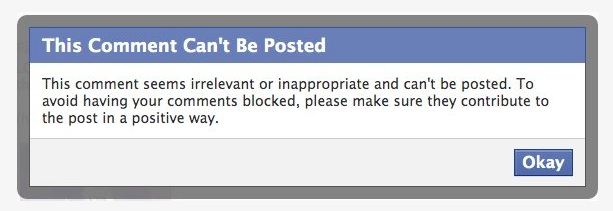An automated Facebook spam filter gone slightly awry, not purposeful censorship, is to blame for startup enthusiast Robert Scoble and some other commenters getting blocked, according to a company spokesperson.
Users attempting to comment on blog posts have recently been prevented from doing so, with warning text from the company saying that “this comment can’t be posted” because it is “irrelevant or inappropriate.” We’ve heard back from Facebook, and here’s what it says has been going on.
The company says that the intention is to bar spammy or abusive commenters. Scoble’s comment was specifically blocked because of its length, and the length of the comment thread it was on. Long and popular threads are particularly attractive to spammers as they provide the largest distribution for whatever content is being spammed. Facebook also may block other types of comments that go against positive conversation, such as some ASCII art. Other factors may include who you’re commenting on, how long the comment is, and who is commenting.
Sentiment itself is not considered, the company says.

The wording is somewhat confusing, as “irrelevant or inappropriate” comments are a subjective judgement that could apply to many topics. But this doesn’t appear to be some sort of content filter that Facebook could tune to specific political content in order to get the social network approved to operate in certain countries like China. The company will be sending us an official statement soon and the specific reason Scoble’s comment was barred.
Update: Here is the official statement from Facebook:
“To protect the millions of people who connect and share on Facebook every day, we have automated systems that work in the background to maintain a trusted environment and protect our users from bad actors who often use links to spread spam and malware. These systems are so effective that most people who use Facebook will never encounter spam. They’re not perfect, though, and in rare instances they make mistakes. This comment was mistakenly blocked as spammy, and we have already started to make adjustments to our classifier. We look forward to learning from rare cases such as these to make sure we don’t repeat the same mistake in the future.”
And here’s what Facebook told Scoble, which he’s commented (!) with further thoughts on our previous post:
Facebook PR responds.
I just talked with Facebook PR about my “comment censorship issue.” They say what actually happened is my comment was classified as spam. He further said that this was a “false positive” because my comment was one that Facebook doesn’t want to block.
Turns out that my comment was blocked by Facebook’s spam classification filters and that it wasn’t blocked for what the comment said, but rather because of something unique to that message. They are looking more into it and will let me know more later, after they figure out what triggered it. Their thesis is that my comment triggered it for a few reasons:
1. I’m subscribed to @max.woolf https://www.facebook.com/max.woolf and am not a friend of his in the system. That means that the spam classification system treats comments more strictly than if we were friends.
2. My comment included three @ links. That probably is what triggered the spam classification system.
3. There might have been other things about the comment that triggered the spam system.
The PR official I talked with told me that the spam classification system has tons of algorithms that try to keep you from posting low-value comments, particularly to public accounts (er, people who have turned on subscriptions here on Facebook).
I actually appreciate that Facebook is trying to do something about comment quality. I had to recently change my privacy settings to only allow friends of friends to comment on my posts because I was getting so many poor comments on my posts (when I did that the poor quality posts instantly stopped).
The PR person also said that a team is looking into why this message got a false positive, and will be adjusting the algorithms to let messages like these get through the system.
Also, the error message made it sound like the message was blocked because of the content of the message, not because it looked spammy. They are looking into the wording of the error and will update that to make the error clearer as to what’s going on and why the spam classification system got kicked in.
More as I learn more.
[Image via Robin Wauters/Flickr.]
